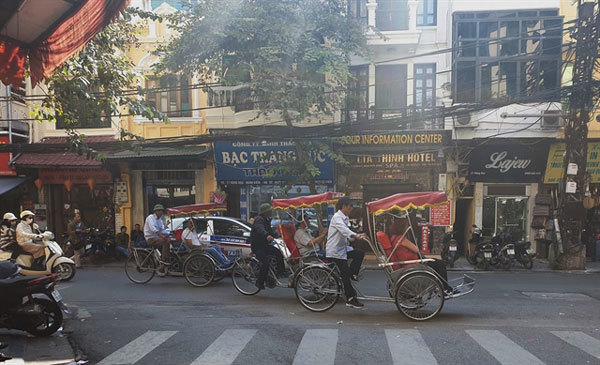 |
| Cyclos seen in the Old Quarters. The three-wheeled vehicles are still a popular mode of transport for tourists. VNS Photo Ngoc Tram |
Cyclos, three-wheeled bicycle taxis, are among the vehicles that would be affected by the law. Many cyclo drivers have expressed doubts about the ban.
“If they told us to stop, we would have a hard time finding another job,” said driver Pham Duy Kiem. “[And] it will affect Vietnam’s tourism industry.”
Bui Quang Tuat, who has been driving cyclos for almost 30 years, is similarly concerned.
“Of course, it affects our lives,” Tuat said, “because we only have a little farmland back home, and we can only farm in certain seasons, so if we don’t have side earnings, then we can’t survive.”
Many three-wheelers are unregistered and do not comply with safety standards. City officials publicised a plan to remove the unlicensed vehicles from the road in June 2018. However, it was never enforced.
In spite of officials’ unease, cyclos are still a popular mode of transport among tourists, many of whom see no problem with letting bicycle taxis and other three-wheelers remain on the road.
“I didn’t really know that they were considered unsafe,” says Dalton McNaught, a backpacker from Canada. “I’ve ridden a few, and it’s been fine… so it’s interesting to see that they might be banned.”
If enforced, the ban would be a part of the People’s Committee’s push to amend local transportation regulations. — VNS

Hanoi considers banning three-wheeled vehicles
Hanoi authorities have considered banning three-wheeled vehicles, including cyclos.
 Three-wheeled vehicles may soon be banned in Hà Nội. The Hanoi People’s Committee announced in a recent statement that the new rule would increase road safety and support efforts to improve air quality in the capital.
Three-wheeled vehicles may soon be banned in Hà Nội. The Hanoi People’s Committee announced in a recent statement that the new rule would increase road safety and support efforts to improve air quality in the capital.